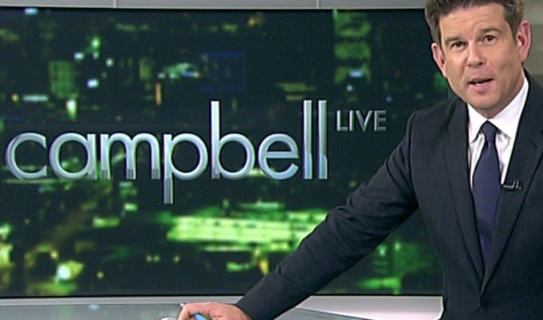
Carolyn Skelton
COMMENTARY: AUCKLAND (Evening Report NZ/Pacific Media Watch): A strong public service media is needed for democracy to thrive – such media is becoming an endangered species in New Zealand. The intense coverage of the possible axing of TV3’s Campbell Live highlights the current state of public interest broadcasting, and the need for it to be strengthened.
Yesterday John Drinnan reported on the possibility of Campbell Live being axed:
That is one of the options in a “consultative document” handed out yesterday, which left Campbell Live staff shell-shocked.
John Drinnan has pointed out allegations of political bias and interference from some of the top brass at TV3
Some Campbell Live staff believe that is because the show’s liberal focus – and Campbell’s heroic status among some on the left – clashes with its bosses’ political outlook.
In support of such a view, Rex Widerstrom outlines the long connections between Mark Weldon, the CEO of the company that owns TV3, Mediaworks, and John Key. Widerstrom also associates Weldon with a strong right-wing agenda.
The focus in much of the news coverage has been on ratings. However, that focus in itself, shows a bias towards commercial imperatives, inevitably leading to infotainment.
Guyon Espiner asked if audience numbers didn’t amount to a democratic vote. That is a very superficial understanding of democratic processes.
Critical debate
A strong democracy requires and informed and critically engaged general population. And that requires the media to play a role in informing, educating and encouraging critical debate.
Furthermore, the encouragement of such debate does not require a huge daily audience for a public interest programme. Such programmes as Campbell Live, and many on Radio New Zealand, put various ideas and information into circulation that can spread well beyond the initial audience. And that process of wider circulation can get a very strong boost from social media these days.
On the ratings issue, Gordon Campbell has pointed out that the state of Campbell Live’s ratings relies to some extent on the audience delivered to it by the preceding 6pm TV3 News:
Few people are looking at whether TV3’s news hour is doing a good job of delivering Campbell Live enough viewers, come 7pm. It shouldn’t all be blamed on Campbell himself.
He also points to the influential role played by Julie Christie, who is believed to have been gunning for Campbell Live for a while:
The key decision- makers in TV3’s decisions over Campbell Live seem to be its new CEO (and former Stock Exchange head) Mark Weldon, and TV3 director Julie Christie, the queen of reality television.
[…]
Her career as a producer began with Mud and Glory : Great Rugby Stories, and with Rachel Hunter: Cover Girl and it has been more of the same ever since.
Relic of the past
Gordon Campbell points to the demise of informative and critical public interest broadcasting:
Wow. The person who made television stars out of Matthew Ridge, Marc Ellis and April Ieremia. No wonder John Campbell is doomed. And no wonder we have a system of television where the notion of broadcasting as a public service is increasingly, a relic of the past.
Russell Brown makes some similar arguments:
While there have been some flat spells in its [Campbell Live’s] 10 years on screen, it has also reeled off a series of important, influential and long-running stories, and tugged its readers’ heartstrings the way TV current affairs should. By contrast to Seven Sharp, it holds on to most of its lead-in news viewers and occasionally does better.
Brown quotes from a National Business Review article of April 2:
NBR understands last year Ms Christie made it known Campbell Live’s days were numbered.
[..]
She went around saying, ‘He’s over, he’s finished’,” the insider claims.
Invented position
Brown is highly critical of Christie:
For someone in governance to behave as Christie is said to have done – when her target was coming up for a contract renewal – is not so much unwise as insanely irresponsible. If Grant is right, she’s cost the company a lot of money. She might have been able to get away with this kind of thing as CEO of her own companies, but as a board member helicoptered in to an invented management position it’s frankly inept.
Brown goes on to say:
As I write, the #SaveCampbellLive hashtag is trending number one on New Zealand Twitter – ironically achieving the all-important engagement numbers TV3 didn’t get this week with the Paul Henry launch. There’s also a petition calling on potential major advertisers to get in behind the show and another directed at Mediaworks management. That may not be enough to actually save Campbell Live.
Brown suggests maybe a new and better home could be found for Campbell Live. The only such possibility on a Freeview channel, would likely be Māori Television. However, he does also suggest part of the problem is the decline in viewers of free-to-air TV.
I think he is being overly pessimistic.
Critical, educational and informative public interest content has declined over the last 7 years (as Peter Thompson mentioned on RNZ this morning)
But it is not inevitable that will continue. Furthermore, the future of TV is likely to include a greater convergence with online and ondemand content. And it is not necessary for that will all to be subscriber based.
Carolyn Skelton is an Evening Report columnist. She is very committed to the ideal of a critical Fourth Estate, necessary for democracy. She has had quite a bit of experience teaching film, tv and media studies in universities. This article was first published here.
This work is licensed under a Creative Commons Attribution-NonCommercial 3.0 New Zealand Licence.
THE #SAVECAMPBELLLIVE PETITIONS:
@actionstation >> http://www.actionstation.org.nz/savecampbelllive
@change >> https://www.change.org/p/tv3-save-campbell-live
@scoopnz >> https://www.toko.org.nz/petitions/save-campbell-live




